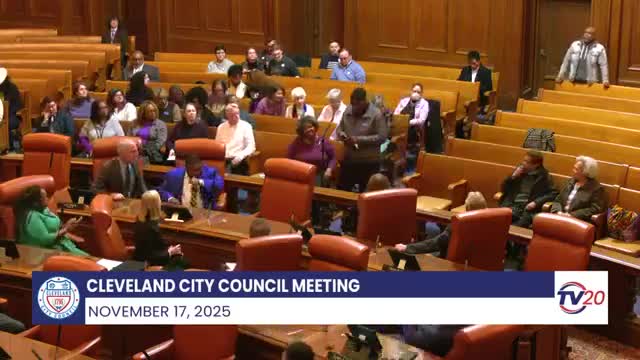Residents and advocates press Cleveland council to advance ‘Tanisha’s Law’ and fund non‑police crisis response
Get AI-powered insights, summaries, and transcripts
Subscribe
Summary
Residents, advocates and council members urged Cleveland City Council to hold hearings and act on Tanisha’s Law — proposing community-based crisis response — and questioned the city’s use of ShotSpotter and other surveillance technology.
Advocates and residents urged Cleveland City Council on Monday to advance “Tanisha’s Law,” push for community-based crisis response integrated with 911, and reconsider spending on surveillance technology such as ShotSpotter.
Michael Anderson, who identified himself as Tanisha Anderson’s uncle, urged council action and described the toll his family has faced since Tanisha’s death: “For 11 years, we have presented ourselves with dignity and respect… I am Tanisha Anderson’s uncle,” he said while emphasizing the family’s continued pursuit of accountability.
The speakers said Tanisha’s Law would institutionalize community crisis response models used in other cities. Pete Van Leer, who described municipal programs in Durham and Albuquerque as models, argued Cleveland should embed a community safety/care unit in city government and fund it sustainably rather than rely on short pilots. “Take the more than $900,000 a year the city now spends on ShotSpotter and use it to keep our communities safer by passing and funding Tanisha’s law,” Van Leer said, citing the city’s current spending on gunshot-detection technology.
Terry Wing of the Police Commission raised related concerns about surveillance tools and data access, saying Cleveland Division of Police and technology vendors did not provide the full data researchers requested and that long-term studies show many alerts produce no evidence of a gun-related crime. He urged scrutiny of any proposed replacement product and of how automated license-plate readers were deployed.
Councilwoman House Jones described a longstanding push to align city grant programs with the legislation and faulted the administration for a slow written response to the bill. She said the city’s Protect and Connect grant was initially approved on 01/22/2024 and that the administration’s recent reply arrived “371 days” after the law’s introduction, without recommending a department to implement the proposal. House Jones asked the body to schedule a committee hearing to examine the bill and related grant alignment.
Supporters urged the council to consider whether reallocating funds toward trained mental-health responders and integrating those teams into 911 would produce greater public-safety benefits than continued reliance on acoustic surveillance. No formal council action on Tanisha’s Law was taken during the meeting; councilmembers and advocates left the matter pending committee review and further administrative response.
